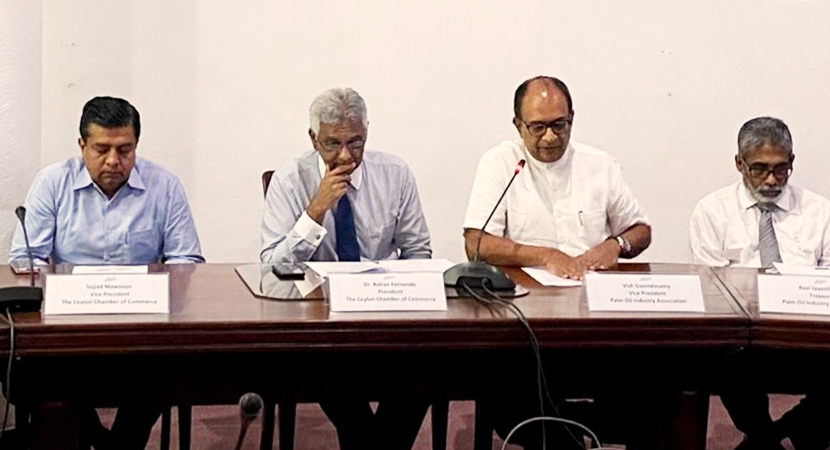POIA re-elects founder office bearers to continue advocacy in national interest

- Says it has presented facts to President in expectation of pragmatic solution to oil palm ban
- Projects significant saving in foreign exchange outflow for imported palm oil, if local production allowed to grow
Business leaders pledged to continue their advocacy, in the national interest, on behalf of Sri Lanka’s beleaguered palm oil industry with the re-election of the founder office bearers and committee of the Palm Oil Industry Association (POIA) for a second two-year term at the apex body’s Annual General Meeting (AGM) last week.
Re-elected POIA President Dr Rohan Fernando disclosed that representatives of the Association had met President Gotabaya Rajapaksa to present their appeal for a pragmatic solution to the impasse created by non-scientific opposition to the cultivation of oil palm that had led to the president announcing a ban on further expansion of the crop, placing a Rs 26 billion investment in jeopardy.
“We have presented the facts that respond to the environmental and other concerns expressed by critics, and elaborated on the economic potential of the industry in terms of supporting the government’s efforts to conserve foreign exchange through import substitution, and to generate better wages for plantation workers,” Dr Fernando reported.
The office bearers and executive committee re-elected for 2020-22 comprises of Dr Rohan Fernando (President), Messrs Vish Govindasamy and Sajjad Mawzoon (Vice Presidents), Mrs Oshadhi Kodisinghe (Secretary), Mr Ravi Jayatilleke (Treasurer) and Messrs Gayan Samarakone, Bhathiya Bulumulla, Lalith Obeyesekere, Thishan Karunasena, Manjula Narayana, Manoj Udugampola and Binesh Pananwala.
The Palm Oil Industry Association represents cultivators as well as refiners, processors, manufacturers, marketers and sellers of palm oil and other products of the oil palm, who have cumulatively invested Rs 26 billion in the industry. Sri Lanka has less than 11,000 hectares under oil palm – just over 1 per cent of the extents under tea, rubber and coconut – and plantation companies had been mandated by a government decision in 2014, to increase the total area under oil palm to 20,000 hectares under strictly-enforced guidelines that ensure the industry is environmentally non-invasive, before the government back-pedalled on the plan, leaving companies with oil palm saplings to the value of Rs 500 million in nurseries.
The Association has repeatedly stressed that the campaign against oil palm cultivation in Sri Lanka is based on untruths, half-truths, misrepresentation and panic-mongering and that the country’s oil palm cultivation is a case study for guilt-free palm oil, because lessons learnt from the mistakes of other countries have been implemented in a slow and measured expansion of oil palm cultivation over the past 50 years, with no deforestation, no habitat loss and no adverse environmental or climate impacts scientifically attributable to the crop.
Addressing the AGM after the executive committee’s re-election, Dr Fernando pointed out that palm oil is the most-widely used vegetable oil in the world, meeting 42 per cent of global demand from only 14.8 million hectares of land world-wide, while Soya Bean, the No. 2 crop, meets only 29.8 per cent of the global oil demand from 103.8 million hectares of land.
He said the current mean national yield of coconut oil is 0.8 MT per hectare in contrast to the global mean palm oil yield of 3.8 – 4.0 MT per hectare, which means that five times more land needs to be allocated to produce an equivalent volume of coconut oil.
“A worker employed in an oil palm plantation earns an average of over Rs. 60,000 per month, which is more than twice the wages of a worker employed on a tea or rubber plantation, Dr Fernando said. “Therefore, cultivating oil palm is one strategy to address low worker wages within permissible limits and oil palm is also an economically-viable crop for smallholders.”
He added that the opportunity for import substitution is also immense in Sri Lanka as the country imports almost 220,000 MT of palm oil per year. We produce only around 25,000 MT of palm oil per year and coconut oil cannot meet the balance demand. An increase in local palm oil production could enable a foreign exchange saving in the region of approximately Rs 30 billion,” Dr Fernando said.
Addressing the most common argument used against oil palm, Dr Fernando said: “Critics allege that cultivation of oil palm has affected rainfall in Galle, Kalutara and other districts. However, in the last several years rainfall in these districts has increased and caused flooding, which clearly shows that there has been no drop in rainfall in any of these districts. On the contrary, rainfall has drastically reduced in the last 10 years in the Nuwara Eliya and Kandy Districts, where there is no oil palm cultivated.”
The POIA remains hopeful that President Gotabaya Rajapaksa will favourably consider the Association’s request to permit the planting of saplings legitimately imported by plantation companies in response to the 2014 Cabinet decision during the presidency of H.E. Mahinda Rajapaksa to expand the extent under oil palm cultivation up to 20,000 hectares, Dr Fernando said in his concluding remarks.
Photo caption: The re-elected office bearers of the Palm Oil Industry Association (from left) Sajjad Mawzoon (Vice President), Dr Rohan Fernando (President), Vish Govindasamy (Vice President) and Ravi Jayatilleke (Treasurer)